News & Events in Belarus
New grand projects with Russia, drone ban, ‘village of the future’ in President’s Week
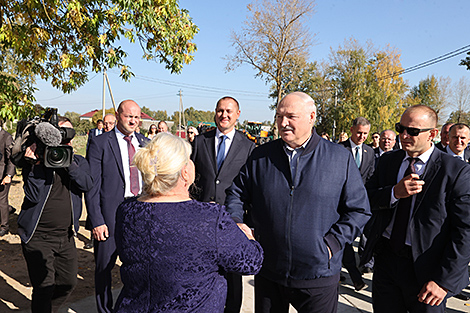
The work schedule of the Belarus president is always full of events. Aleksandr Lukashenko holds conferences and working meetings on the most topical matters concerning the country’s development, regularly visits the regions, goes on foreign trips and welcomes foreign guests, talks to reporters, signs decrees and laws. And even if there are no public events, it does not mean that the head of state does not work. It must be said that even when he relaxes, for instance, by playing ice hockey or chopping firewood, Aleksandr Lukashenko happens to find the time to give yet another instruction. All the decisions must be prompted by life, he likes to say.
The President’s Week project is intended for those, who want to keep up with the head of state, be up-to-date on the latest statements and decisions of the Belarusian leader.
What three oblasts did Aleksandr Lukashenko assert “iron control” over? Why would Belarus have been erased from the face of the earth for repeating the USA’s experience? Is innocence acceptable during election campaigns? Strict restrictions for drone owners, what drone owners will have to do within the next six months, and what the reasons behind the president’s decision are.
What foreign guests visited the Palace of Independence and how can they help avoid a world war? A “secret” conversation with Putin that has never been mentioned in mass media, and new ambitious projects. How have sanctions affected relations with Russia’s Leningrad Oblast? Does Belarus expect any overseas mercies? What practical lesson did the head of state carry out in Mogilev Oblast ahead of Teacher’s Day and what will the village of the future be like?
These and many other questions are covered by the latest episode of BelTA’s special project President’s Week.
PERSONNEL PLACEMENT. What tasks did Aleksandr Lukashenko give to municipal authorities?
Lukashenko to heads of district administrations: make your subordinates do it. What was he talking about?
The president’s work week began on 25 September with personnel appointments. One of the key messages sent by Aleksandr Lukashenko to newly appointed heads of municipal authorities focused on work with subordinates and greater exactitude. All for the sake of the key goal: fulfillment of assigned tasks.
The head of state recalled that a number of tasks were set at the national seminar-conference on the development of livestock industry last week. Moreover, many of those the president addressed on 25 September were present at this event. “You know and understand the tasks that were set for livestock farming. The only thing I ask of you is not to be lenient and permissive. Those of you who, worked in agriculture, and to a lesser extent others know what I am talking about. People will come to you and say that this or that is impossible,” Aleksandr Lukashenko said.
“But, as I often say, we are not at war. We do what we have always done in peacetime and what we know how to do. Make your subordinates do this,” the head of state demanded.
The president noted that there are enough issues in all regions, but three regions need increased attention: “Vitebsk Oblast and Gomel Oblast, Mogilev Oblast need iron control.”
Forget innocence when elections are around the corner
The president’s conversation with heads of municipal government agencies also touched upon preparations for the forthcoming election campaigns. “I ask you and emphasize it once again: there is no Communist Party, everything is in your hands [a comparison with the Soviet times, when the party played a significant role on the ground]. The country is gearing up for major election campaigns and the ideological component is of paramount importance. Please, think about who will represent you in the parliament, the Belarusian People’s Congress. We do not hide the fact that we have our nominees. It is natural. If we presented ourselves as kind of innocent, you know, we would be laughed at,” the head of state said. “This is a natural thing in any state, even the most democratic one. The USA has always taught us how to live. You see how election campaigns are conducted over there. God forbid we conduct elections their way, especially voting by mail. If we conducted it in this manner, we would be… We would have been erased from the face of the earth.”

“This is why we have our own tasks, our own goals. Pick up worthy patriotic people, professionals. Support them in the parliamentary elections and the elections to the Belarusian People's Congress. I don’t hide anything and you have nothing to hide either. But these should be professionals, decent people. We don’t want people to slam us when they learn about the candidates. We have enough smart, talented people,” Aleksandr Lukashenko said.
Troubled factory in Molodechno. Does it have some potential? What are the perspectives? What did Aleksandr Lukashenko instruct?
Aleksandr Lukashenko wondered about the state of affairs in Molodechno District. He asked Yuri Gorlov, the former chairman of the Molodechno District Executive Committee who had been appointed the President’s Aide, Inspector for Gomel Oblast, about it. Although the situation in the region is stable, all the main social and economic development targets are getting hit but there are also complications.
The president asked what Molodechno’s most troubled enterprise was. It was a metal structures plant. The enterprise does not have the necessary workload, and this issue has already been addressed at various levels, a number of instructions have been given, including by the prime minister.
“Molodechno District and Minsk Oblast cannot provide enough orders [to keep the company busy]. A proposal was put forward to use the company’s products in the manufacturing industry of the republic,” Yuri Gorlov explained.
At the same time, he noted that there are other enterprises in the country that make similar products. Therefore, the company is looking for orders abroad, and is currently working on a project with Russian partners. “I think that as early as this year we will start producing experimental samples of containers for transporting LNG (liquefied natural gas). If the project takes off, the enterprise will operate at 60-70% of its capacity. We will pull it off. We already have samples,” he said.
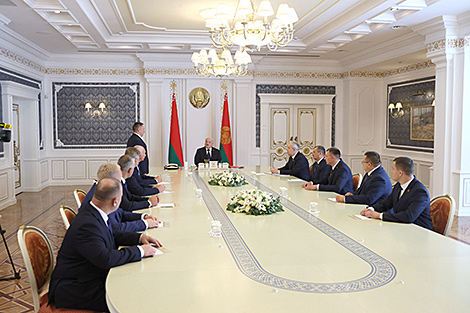
“If you make them, they will order them from you. In fact, they have a huge demand for this product over there. You just need to make a quality product,” the president emphasized.
“This product can be used not only [for transportation] by rail. It can also be used in sea vessels,” Yuri Gorlov clarified.
“Even better!” noted the head of state.
Yuri Gorlov continued: “We have teamed up with partners from Leningrad Oblast and St. Petersburg. We are working together. They are responsive, they meet us halfway. I have recently had a personal meeting with them. We are negotiating this issue.”
At the end of the conversation Aleksandr Lukashenko instructed Yuri Gorlov to keep an eye on these issues while working in his new capacity and report to the president about the progress: “This year will pass, the next one will begin - tell the government that you have this matter under control. Keep me posted. No other company in the country can do what the Molodechno enterprise did and can do with metal structures. This is a solid enterprise. Make sure it can meet the country’s needs for these products fully. We must proceed from this. It is rather narrow-minded to think that a company located in Molodechno cannot extend its reach to Minsk Oblast and further.”
BAN ON DRONES. Lukashenko bans Belarusians from flying drones
On 25 September Belarus President Aleksandr Lukashenko signed a presidential decree on the state record keeping and operation of civilian unmanned aerial vehicles. The fact that the document bans individuals from importing, storing, operating, or manufacturing drones in Belarus is the most debated peculiarity of the decree. There is only one exception: corporations and self-employed businessmen can use drones for commercial activities while meeting stringent requirements specified by the decree.
The decree prohibits natural persons from importing, operating, and making drones as of the official publication date. The decree prohibits individuals from storing, selling, and buying drones six months from the official publication date. Belarusians have six months to sell their drones to the organizations or self-employed businessmen that can fly them or hand them over to the organization chosen by the government for storage.
Taking into account the situation in the world and around Belarus, such tough measures look quite justified. The main goal is to ensure public security and order in the country.
BEST RELATIONS EVER? NOT YET. How can exemplary relations with Russia’s Leningrad Oblast be improved?
On 26 September the Palace of Independence welcomed a Leningrad Oblast delegation led by Governor Aleksandr Drozdenko.
Aiming for $1 billion trade turnover
Welcoming the guest, Aleksandr Lukashenko described relations with this Russian region as exemplary. He said: “We would like to place our primary focus on your region in Russia.” The president expressed confidence that given the excellent relations between Belarus and Leningrad Oblast, the efficiency of the partnership should be higher. The head of state recalled that during the previous meeting with the governor, the parties set a goal to reach a billion dollar in trade. “To achieve this, year-on-year supply volumes will have to grow by 20%. I believe that the task is feasible in the current situation, and we will definitely not limit ourselves to a billion. This is a provisional guideline,” the Belarusian leader noted.
How Lukashenko and Putin agreed to build aircraft and a railway
“In one of your speeches, you said that the traditional advantages of Leningrad Oblast bordering on the European Union have become risk factors since 2022. But this situation has been very beneficial to us and actually to Russia, too. We will now rely more on ourselves and think how we move forward,” the Belarusian president told the governor.
In this regard, Aleksandr Lukashenko mentioned the recent telephone conversation with Russian President Vladimir Putin, during which they discussed two major projects, namely joint production and maintenance of aircraft and the construction of a second railway line from Belarus to St. Petersburg and Leningrad Oblast.
According to the president of Belarus, they are scheduled to meet in Kyrgyzstan in mid-October (the CIS summit will be held in Bishkek) where they plan to discuss these projects in more detail.
“We discussed the joint production of small-capacity aircraft that are in great demand in the Russian Federation. According to the president of Russia, such aircraft can be operated from large airports and remote villages and regions, especially since they can land on unpaved runways,” Aleksandr Lukashenko explained.

Belarus has the necessary competencies in this field, so the president of Russia proposed to make these aircraft together with the Belarusian side, as well as to expand the production of individual components for the IL-96 aircraft and to service them in Belarus.
“We can do this. Yet, this is a very big chunk of work,” said Aleksandr Lukashenko.
The other project that the two leaders discussed was the construction of a second railway line from Belarus to St. Petersburg and Leningrad Oblast that will be used to transport large volumes of cargo to Russian ports from where cargo will be shipped to various parts across the globe.
“You understand that this is very important for us. We are engaged in port infrastructure development over there. But the railway is our bottleneck,” the Belarusian leader noted.

According to the president, these projects have already been discussed with Russian government agencies. A package of necessary documents and materials has been prepared and will be handed over to the Russian head of state.
“If Leningrad Oblast was still focused on its neighbors, on the European Union, then these matters would, probably, have not been on our agenda. There are no unilateral gains and failures. I think we will cope with the problems that we have now (they are being solved and we see it),” Aleksandr Lukashenko stressed.
Why set up enterprises to make the same products when it is always possible to trade?
“With your help, we have redirected logistics and our manufacturers once again have the opportunity to trade in Asia, Latin America, the Middle East, and Africa. We will step up our efforts on this front,” the president told the Leningrad Oblast governor.
“For many Western politicians, it was a real revelation that the world is much wider than their narrow ideas about it. They decided to act in the Russian way: get into the fight and then see what will come out of it. It turned out that if you are not Russian, this way will not work for you,” Aleksandr Lukashenko said.
Thanks to industrial cooperation, Belarus and Russia managed to make the most effective use of each other’s strengths to achieve technological sovereignty, the president said. “This will enable us not only to respond to any pressure attempts by the West but also create a new, healthy competitive environment within our union [the Union State],” Aleksandr Lukashenko is convinced.
He gave a simple example: despite the powerful development of the agricultural industries both in Belarus and Leningrad Oblast, the parties do not compete but successfully find areas where they can support each other.
“The areas where we really shine are the production of agricultural machines and equipment, grain drying complexes, equipment for feed mills as well as food production, seed production, and many other industries,” the president continued. Belarus is actively sharing its best practices with farmers from Leningrad Oblast, including its knowhow in the field of veterinary medicine, where the first steps have been taken to develop cooperation.
Of interest to Belarus is Leningrad Oblast’s expertise in livestock breeding, the production of valuable fish species, and the technology of operating greenhouse complexes.
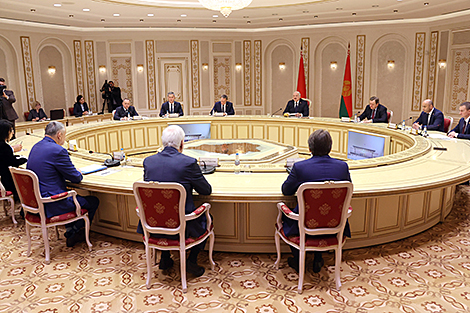
“In turn, farmers from Leningrad Oblast may benefit from our experience in cultivating winter barley and rapeseed,” added the Belarusian leader. “I also propose to thrash out plans to increase supplies of Belarusian agricultural machinery, including using regional subsidies, as well as equipment for the processing industry,” the president suggested.
Aleksandr Lukashenko cited cooperation with Russia’s Krasnodar Territory as a case in point: “They opted for our equipment, we responded. We are bringing our technologies and competencies there... We started out from assembly factories, now we run joint ventures, increase the localization level. We can do the same together with you,” he suggested.
The president also touched upon cooperation in transport infrastructure development. Belarusian enterprises are actively participating in the construction of the Vysotsky Grain Terminal in Vyborg District, which will have the storage capacity of 210,000 tonnes of grain (the terminal’s designed throughput capacity is 4 million tonnes per year).
“I am sure that this project will also be highly beneficial to our friends from Latin America: Brazil, Venezuela, and other countries,” the Belarusian leader said.
He thanked Aleksandr Drozdenko for his decision to invite domestic enterprises to implement projects in Leningrad Oblast. One of such projects is the construction of water purification and treatment stations. Belarusian technologies were used in turnkey projects to build 37 such facilities in Leningrad Oblast.
“I have been told that you have drafted a program to build more than 100 such facilities. Our Development Bank is ready to take part in funding these projects,” the president said.
The projects that Belarus is running in Leningrad Oblast include the construction of a school for 825 children in Lomonosovsky District of St. Petersburg. According to Aleksandr Lukashenko, the government is mulling over the provision of a special export loan.
Speaking about new avenues of cooperation, the head of state mentioned the participation of Belarusian design, construction and installation organizations in comprehensive upgrade of fuel and energy facilities (boiler houses), in the construction and renovation of heat supply facilities for municipal districts of the region as well as the supply of Belarusian building materials, road construction equipment, cement, wall materials, prefabricated structures, and bitumen, as well as the exchange of best practices in using advanced road construction technologies.
Aleksandr Lukashenko proposed not to create parallel (overlapping) capacities to produce goods that can be imported from Belarus. “You and I will always come to terms on supplies, always, and for a long term. Today both of us need to spend money on essential things. Why create overlapping production facilities? And the areas I have listed are related to this issue. Mutual exchange of products is very important,” the Belarusian leader noted.
“If you need any help, you can count on us, we will not let you down,” the president added. “We should explore the areas where we can complement each other and achieve good results in order to meet the goal that we have set,” he noted.
TO PREVENT A NEW WORLD WAR. Lukashenko outlines a key task for diplomats and other people
Foreign guests were welcomed in the Palace of Independence on 28 September. They came from non-CIS states this time. The Belarus president accepted credentials from ambassadors of 11 countries: Kazakhstan, Hungary, Egypt, Zimbabwe, Equatorial Guinea, Angola, Uganda, Cambodia, the Philippines, Jordan, and Colombia.
Aleksandr Lukashenko welcomed the diplomats by saying: “I hope that your diplomatic work will bring our nations closer and help build truly friendly interstate relations.”
According to the president, the ambassadors are embarking on their mission in a very difficult period: “Today a new structure of international relations is emerging and it is steadily moving towards multipolarity. This process is irreversible, no matter how much someone would like it otherwise. We are witnessing the rise of what I see as a more fair and reasonable model of interaction between all nations, and not only privileged states, on the principles of respect and partnership.”
Belarus, a country that has gone through many ordeals and military conflicts, has learned history lessons very well, the president emphasized.
“Our main task is to prevent a new world war,” he said. “Minsk consistently pursues a very responsible foreign policy. Never in history have we extended our jurisdiction beyond national borders.”
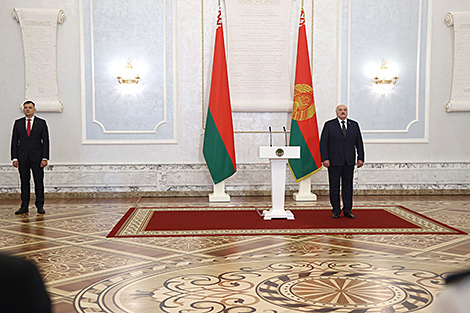
“We are committed to an open and peaceful policy. Yet, not all Western democracies like this. Having realized their impotence, they resort to sanctions,” the Belarusian leader continued.
Addressing the diplomats, the president stressed that the countries they represent have repeatedly experienced the effect of illegal restrictive measures by the West. Just like Belarus. “Therefore, we have consistently and persistently opposed any illegal restrictive measures that harm not so much us as the whole world,” Aleksandr Lukashenko said.
The president cited a number of examples to illustrate his statement. Thus, sanctions against Belarusian potash fertilizers, agricultural products and equipment have seriously undermined the global food security, affected yields and food prices, while millions of people in the world are starving.
“I am sure that it is in our common interest to speak even louder about this problem and jointly seek the abolition of restrictions on trade, especially on vital commodities. Moreover, the answers to these challenges have already been found,” the Belarusian leader said. “Now new settlement systems in national currencies are being actively formed, logistics is being rebuilt. These things are discussed in the SCO and BRICS. Everyone is tired of constantly waiting for mercy from across the ocean.”
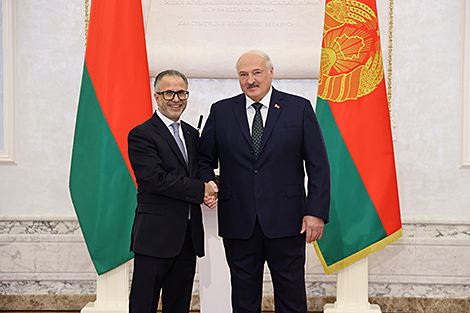
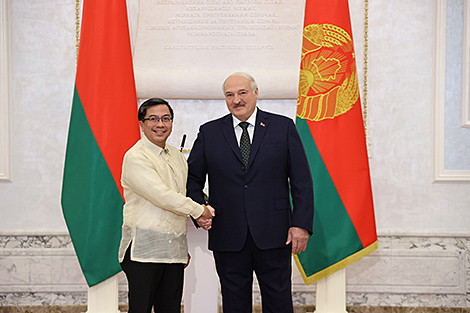
The president emphasized that Belarusians, despite all the difficulties and barriers created by the West, have not turned away from their path of development. The Belarusian economy is confidently back on the growth track.
In his words, Belarus is open to all people of good will. The country has waived visas for citizens of many countries. Despite Western restrictions Belarus hosts a lot of remarkable international cultural and sport events.
All this reflects the true aspirations of our people and is, among other things, a response to those countries that mistreat migrants, tighten entry rules, create barriers, close checkpoints, threaten transport blockades, and simply eliminate people, the president stressed.
In the current situation the development of trusting and stable relations with friendly partners abroad is of particular importance for Belarus. “There are a lot of such partners around the world. You are evidence of this,” the Belarusian leader said addressing the ambassadors.
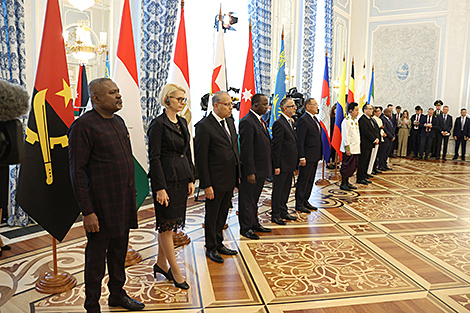
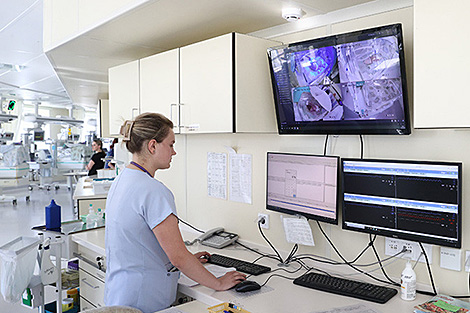
The president recalled that 2023 has been declared the Year of Peace and Creation in Belarus. “I am convinced that you will be guided by these concepts in your work,” he said. “I am sure that your stay here as official representatives of your states will be interesting, rich, and useful from a professional point of view. I would like to reiterate that there are no closed topics!”
Aleksandr Lukashenko promised that everything would be done in Belarus to help the foreign diplomats understand the country better, learn more of its history and culture and experience the fullness of its cordiality and hospitality. “From the bottom of my heart I wish you success in fulfilling your important and responsible mission,” the head of state said at the end of the ceremony.
PRACTICAL LESSON IN THE VILLAGE OF THE FUTURE
On 29 September Aleksandr Lukashenko went on a working trip to Mogilev Oblast. The head of state checked how his instructions to repair roads in promising rural populated localities, develop animal husbandry, and increase production of valuable fish species were being fulfilled.
The village of the future
“The Soviet Union had a good tradition of addresses of best practices. Young people come and would like to see where things are better,” the head of state recalled as he visited the agrotown of Vishov in Belynichi District.
The president explained that the beautification of agrotowns was not randomly chosen as a topic of his working trip. There are almost 1,500 agrotowns in Belarus. “Some 80-85% of the rural population will live in agrotowns in the future. The rest will live in large villages,” Aleksandr Lukashenko said.
Some unpromising villages might also get a boost, but only if there is interest from private individuals.
“But the primary focus is on agrotowns,” the head of state emphasized. “Today we would like to see what the village of the future will look like. We write all sorts of candidate and doctoral theses, dissertations, and it is a shame to read the title, not to mention the contents. Let us write and develop something on these very topics. We have enough specialists who know well how it was, how it is now and how it will be. A whole layer can and should be raised to reflect and act.”
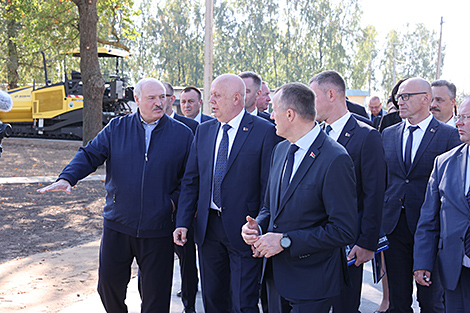
By the way, the Belarusian government started thinking about setting up agrotowns back in the early 2000s. As he addressed Brest Oblast university students in 2004, Aleksandr Lukashenko said: “We are going to develop large-scale agribusiness. Huge complexes, farms, and so on that use 5,000, 6,000, 10,000 hectares of land each. We will preserve the villages that are attached to them and will set up agrotowns. One large collective farm will have three agrotowns – we are going to develop one powerful center and two small ones. A small or medium-sized collective farm may have one agrotown – the central estate.”
The government program on reviving and developing the countryside in 2005-2010 was adopted soon. Master plans were developed for building 1,481 agrotowns across the country. Since then Aleksandr Lukashenko has been visiting agrotowns during working trips every year and getting familiar with how life is organized in these population centers. If there are some problems, they are put on his radar. And cutting-edge practices are spread all over the country. Vishov became an agrotown in 2010.
In 2018 the president instructed the government to work out a mechanism for realizing the village of the future concept. People in agrotowns need to enjoy the same level of comfort that urban dwellers do, Aleksandr Lukashenko pointed out.
Speaking about the development of the countryside during the visit to the agrotown of Vishov, Aleksandr Lukashenko instructed Chairman of the State Control Committee Vasily Gerasimov to look into one more issue: “You have to look into how heads of agricultural enterprises plunder farmland.”
The president said: “I am absolutely convinced (I have serious suspicions) that they keep building these new streets into farmland like they did in the past. But the allocation of farmland has to be authorized. And only by approval of the president. I doubt I have authorized all the land allocations. It is necessary to take a serious look, to audit the use of farmland. A street of 20 houses no longer has occupants because the people have left. But we make new land plots and start building houses on them. Let’s build a house on these [already vacant] land plots or give them to a person, who will build one, in order to restore and reinvigorate this street. It should live. There is no need to convert the field into new land plots. Crazy waste of money. You have to look into this issue.”
Road repairs, unnecessary foot-dragging, and red tape
In the agrotown of Vishov Aleksandr Lukashenko got familiar with a pilot project to repair roads in promising rural areas, including by using cement for these purposes. The project was implemented using different methods: concrete was poured on the destroyed asphalt in some parts, some worn-out road surface was recycled and concrete was added to it. Large-format concrete slabs were laid on some streets.
“Apart from Vishov we have another 1,500 agro-towns where we need to upgrade at least the main streets. We need a sensible approach. We need to create conditions for people to stay in the village,” Aleksandr Lukashenko said.
According to Belarusian Housing and Utilities Minister Gennady Trubilo, there are more than 76,300 streets with the total area of 288.2 million square meters of road surface in the settlements of Belarus. Most of them are made of asphalt. Others are made of concrete. There are also streets with sand and gravel surface.
The head of state demanded to get rid of bureaucratic hurdles in the development of villages and building of new streets and houses. “There is no need for red tape here. We need to do it faster,” the president stressed. “We need to finish this work and get away from these bureaucratic principles. We need to do it in an economical way and we need to remember that we can remove a street and take down houses to make an avenue, but this needs a lot of money.”
“The same is true about single-family houses. An individual wants to build a house, and we get in their way with different regulations. If they want to build, let them build. They build houses for themselves after all,” Aleksandr Lukashenko said.
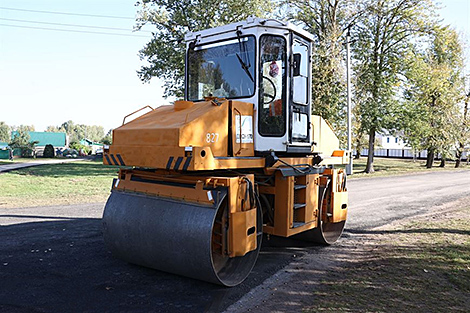
According to the head of state, if the owner of the house will need help from designers or the Emergencies Ministry, the owner will do it themselves, and there is no need to limit house owners by formal requirements.
Quality above all
Housing and Utilities Minister Gennady Trubilo told the president that the tasks related to road repairs are being overfulfilled.
“It’s good that you are overfulfilling, but keep in mind that you will be responsible for the quality. You can’t botch it because it will be costly. That is not our way. Therefore, quantity is a good thing, but quality should be above everything. We need to declare next year the Year of Quality. Everything is fine: output is good and the demand for Belarus’ products is colossal (we are struggling to meet the demand in Russia). Yet, we still have problems with quality. Therefore, quality is of paramount importance,” Aleksandr Lukashenko emphasized.
According to the head of state, he received a complaint about MTZ products the other day. The president told the State Control Committee to look into this issue.
“Get ready for the Year of Quality next year. The Year of Quality in manufacturing, agriculture, in services, and road infrastructure,” the head of state said.
Aleksandr Lukashenko noted that the government is trying hard to maintain good quality of roads, but people should also make their contribution.
“Poor quality of work is unacceptable. Quality is above everything,” added the Belarusian leader.
Ideal dairy complexes
The president has previously instructed to transfer the entire dairy herd into modern dairy complexes within five years. But what should these agricultural enterprises be like? As he visited various agricultural enterprises, Aleksandr Lukashenko was made familiar with their experience in order to choose the optimal design and adopt it all over the country. For instance, the president visited Agrokombinat Yubileiny in Orsha District in July 2023. A robotized dairy complex was built there two years ago. The total cost of four stages of the project is Br71.5 million. Meanwhile, dairy complexes worth Br5-6 million each are being built across Minsk Oblast. Certainly, it is necessary to compare the sizes of the complexes, the amount of work, and the cost of equipment. The difference may be justified. But even if it is true, the president stresses that it is necessary to keep cows in solid and clean premises, they do not need palaces.
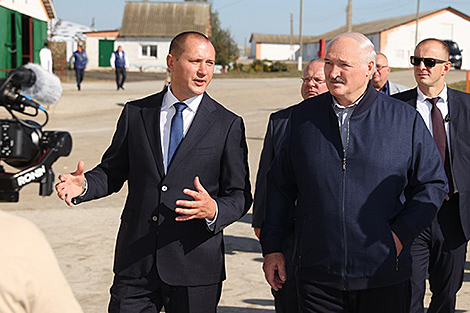
In Belynichi District Aleksandr Lukashenko visited the dairy complex Lyamnitsa of the agricultural enterprise Kolkhoz Rodina. After getting familiar with how milk production is organized and heifer breeding is arranged there, the head of state was pleased with what he had seen.
What makes this cowshed such a good place for livestock? The facility was built using the agricultural enterprise’s own resources. It looks austere, but solid: concrete floors, metal structures, wooden walls, and a slate roof. The construction works, including materials, cost Br185,000. The project was completed within three months.
“That was a truly low-cost project. Well done! Many talk about it, but few people do it. We live in a forested area – you can take a lot from the forest, especially after a windfall. This is the best place for livestock,” he emphasized.
According to Oleg Lapotentov, head of the agricultural enterprise, the enterprise invested Br2.7 million in the renovation of the entire dairy complex, including about Br1.15 million in the upgrade of three cowsheds and the construction of a milking parlor.
out of reinforced concrete costs colossal amounts of money,” Aleksandr Lukashenko said.“There you go! There’s no need to invent anything. Other farms should follow suit. We need to move cattle from barns to such premises”.
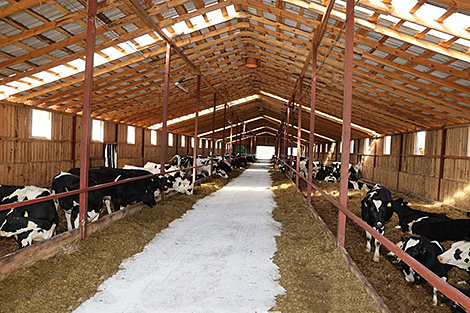
The development of the fishing farming industry
During the working trip Aleksandr Lukashenko visited the Vishov section for high-value fish of the trout farm Lokhva. The head of state is already familiar with the enterprise. He visited it during a working trip to Kostyukovichi District in 2019. Aleksandr Lukashenko gave instructions to update the program on the development of fish farming business. “Why do we take things slowly? What are we afraid of? The technologies are excellent. We can do it. Markets are available. This is why this program should be updated. I need concrete proposals this year. Where are we going to build? What are we going to build? What manufacturing facilities? Let's get down to it. It is necessary to at least double the output of fish. And not only in Mogilev Oblast,” he stressed.
As he visited the Belarusian National Biotechnology Corporation (BNBC) last autumn, the head of state instructed oblast governors to work out new steps to develop fish farming taking into account the availability of modern combined fodder.
The president emphasized that this also includes high-value fish. For example, one of the country’s fish farms has already launched the production of black caviar that outcompetes similar products in blind tastings and is praised by specialists.
“If we can do this and get a good profit margin, well, let’s build more,” said Aleksandr Lukashenko. “Sit down and think what kind of fish we can produce here [in Belarus]. We have the feed for it.”
By the way, the Agricultural Business government program for 2021-2025 provides for almost doubling the output of high-value fish - salmon and sturgeon - throughout the country.
Mogilev Oblast has the same plans, too. As he visited the Vishov section of the Lokhva trout farm, the president was told about prospects of development of the fish farming industry in Mogilev Oblast and measures to ramp up the output of high-value fish. The head of state examined the fish breeding technology used at the farm after that.
“Some 164,000 tonnes of fish and fish products worth $500 million was imported in 2022. This included 9,400 tonnes of fresh and chilled trout,” Mogilev Oblast Governor Anatoly Isachenko informed.
“$500 million worth of import is a good market,” the president noted.
The head of state recalled that in 2019 Lokhva CEO Yuri Kuksenkov promised to “swamp” Belarus with valuable fish. He has yet to do that but the prospects look very optimistic. As Aleksandr Lukashenko was informed, there are plans to build a complex to breed high-value fish in Krasnopolye District near the Paluzh River. The production capacity will be 1,000 tonnes of trout per year. The preliminary project cost is about Br40 million.
Another complex to produce rainbow trout caviar will be built in Cherikov. Its construction will cost almost Br35 million. The design capacity will be 25 million fish eggs per year.
At present Belarus’ demand for fish eggs is 4 million. For now fish eggs are imported. Once the new facilities are up and running, the annual demand will increase eight-fold up to 32.5 million. Therefore, the construction of a trout breeding facility is also under discussion.
The Mogilev Oblast Executive Committee wants to allocate funds for the construction of the fish complexes from its innovation fund. First of all, the money will be spent on production of fertilized fish eggs.
“Okay, we will support it. Even if you run short of funds, we will lend you some money. But we need to build this facility really fast. Let’s bring these two projects to life,” said Aleksandr Lukashenko.
How to preserve peace in Belarus
Once they noticed the arrival of the head of state, residents of the agrotown of Vishov gathered in the street not far from the presidential motorcade.
“We are glad to see you here. Thank you for the peace in our country, for the timely pension payments and the beauty that surrounds us!” one of the residents told Aleksandr Lukashenko.
“Some 25-30 years ago everyone was in favor of dividing kolkhozes [collective farms], sovkhozes [state-run farms], and giving them to private farmers. Later on I was criticized for helping these kolkhozes and sovkhozes. They told me I was wasting that money. I help them because he [the head of the farm] is responsible for not only his farm’s performance but also for streets, villages, pensioners. That is why I help kolkhozes and sovkhozes. This is the responsibility of the state, not the farmer. That's why I still keep doing so,” Aleksandr Lukashenko said.
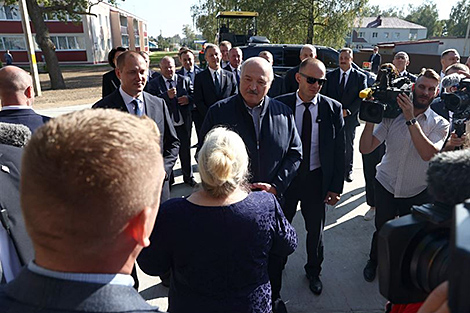
“Those who destroyed this are fighting today. Their land does no longer belong to their farmers, but to someone from across the ocean. We went through this, too. We had to take it away in the name of the revolution. In order to have peace, we need to work hard,” Aleksandr Lukashenko said.
Support for children in large families and support for military personnel
The mother of many Yelena Kalakustova lives in Vishov. She thanked Aleksandr Lukashenko for support available to large families. She is the head of the folk music band Vabichanskiya Uzory in the local community center. She has six kids now. She received an Order of Mother from the president back in 2017.
Yelena Kalakustova told Aleksandr Lukashenko: “I am very proud and grateful to you for support for large families, for your attention, for the care for our kids.”
The president said: “We will take a close look at large families because they vary. This is why I insist now: we will think about ways of getting money to the kids. It is necessary to find a way. We will do everything for children from large families. Because we could use a larger population. We need to increase the population. We could feed twice as many people as we do today.”
“Right you are!” the Vishov residents backed the president.
Support will also be extended to military personnel, the head of state stressed. “They shouldn’t worry that they will not have housing. We will build as much housing as necessary,” he said.
A teacher for the country
Belarus celebrates Teacher’s Day on 1 October. Residents of the agrotown congratulated the president on the upcoming holiday as the head of state is directly related to it.
“You are a teacher of the state now!” the Vishov residents said. “We wish you to stay with us as long as possible.”
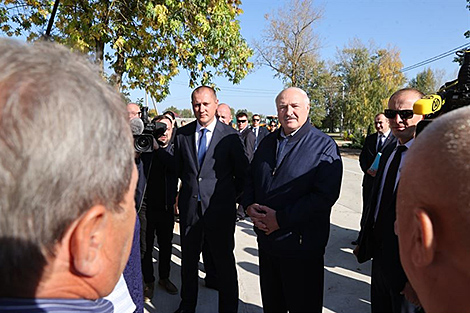
“Do not worry. We will decide together how to live further. Time will come and we will elect a good leader. We just need to be careful and keep our heads cool,” Aleksandr Lukashenko said.
GRASSROOTS DIPLOMACY AS AN EFFECTIVE TOOL. Its value has been confirmed by Lukashenko and Putin
Cooperation with Russian regions was discussed not only in the Palace of Independence and in offices of high-ranking officials but also at the level of grassroots diplomacy last week. More than 200 people came to Brest from various parts of Belarus as well as from Russian cities, including Khabarovsk, St. Petersburg, Krasnodar, Podolsk, and Pskov, to participate in the 12th Forum of Sister Cities of Belarus and Russia. The fact that the Belarusian president and the Russian one have sent greetings to participants of the forum testifies to the importance of organization of such events for building up ties between the two countries.
Aleksandr Lukashenko emphasized the symbolic value of the fact that this year’s forum was taking place in Brest, a city that takes pride in its rich heroic history and embodies the memory of the heroic deeds of the Soviet people during the Great Patriotic War, the fortitude and courage of defenders of the Brest Fortress, the country’s defiance in standing up against the enemy invasion.
“Today the need to preserve the historical truth about the common past is of particular relevance, and authoritative bilateral platforms like this summit serve as an important tool for strengthening fraternal ties between the peoples and countering unprecedented external pressure,” the message of greetings reads.
Aleksandr Lukashenko named the sister cities forum an active form of promoting cooperation between Belarus and Russia in key areas. “This format of interaction plays the role of one of the drivers behind integration processes and continues to prove its relevance in the Union State,” the president emphasized. “I am confident that strong ties between cities will continue to serve as a reliable basis for interregional partnership between Belarus and Russia.”
In his greetings Vladimir Putin said he was confident that communication and discussions during the forum will be informative and constructive and the ideas and initiatives participants of the forum will put forward will contribute to further advancement of multidimensional Russian-Belarusian ties and to enhancing institutions of the Union State of Belarus and Russia.
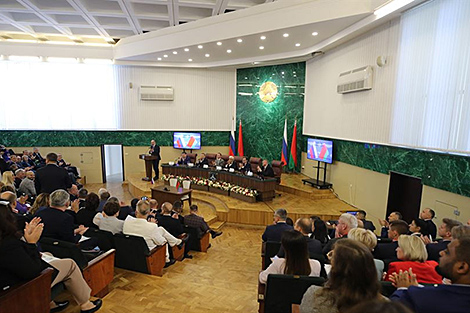


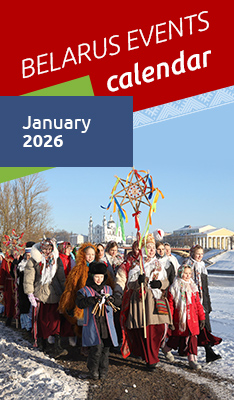




 print version
print version make home page
make home page add to bookmarks
add to bookmarks

